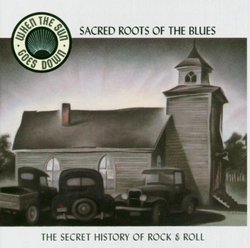| All Artists: Various Artists Title: Sacred Roots of the Blues (When the Sun Goes Down Series) Members Wishing: 1 Total Copies: 0 Label: RCA Victor Release Date: 6/22/2004 Album Type: Import Genres: Blues, Pop, Gospel Styles: Traditional Blues, Traditional Number of Discs: 1 SwapaCD Credits: 1 UPC: 828766008425 |
Search - Various Artists :: Sacred Roots of the Blues (When the Sun Goes Down Series)
 | Various Artists Sacred Roots of the Blues (When the Sun Goes Down Series) Genres: Blues, Pop, Gospel
Reissue producer and annotator David Evans utilizes the Bluebird and Victor catalogs to create a fascinating documentary of the history of African-American religious music. This audio chronology spans from the plantation ... more » |
Larger Image |
CD Details
Synopsis
Album Description
Reissue producer and annotator David Evans utilizes the Bluebird and Victor catalogs to create a fascinating documentary of the history of African-American religious music. This audio chronology spans from the plantation shout of slaves beginning to transform what they were learning in white churches of the 18th and 19th century ("Gabriel") all the way through to the 1940s? syncopated "rhythmic spiritual" sound of Newark?s Southern Sons (1942?s "I?m Free at Last," cited some two decades later by Rev. Dr. Martin Luther King in his speech at the March On Washington) and the Five Trumpets ("Preach My Word," a live 1949 performance in Atlanta that Dr. King may even have witnessed).Among the highlights here is "Oh Death!" performed in 1927 the Pace Jubilee Singers, a song that was also popular among southern whites, as testified by Dr. Ralph Stanley?s Grammy award-winning performance on the O Brother, Where Art Thou? Soundtrack. Also Rev. Isaiah Shelton and a group of sisters? 1927 release of the first version of "The Liar," whose refrain was recast into "Leave My Woman Alone" by Ray Charles in 1956. Stellar solo performances include Marian Anderson?s "Nobody Knows The Trouble I?ve Seen" from 1924, and Paul Robeson?s "Deep River" from 1927 were both arranged and published by Harry T. Burleigh, a protégé of Dvorak, who was an ardent supporter of Negro spirituals as the basis for "a great and noble school of music." The Reverend W. Herbert Brewster of Memphis supplied songs freely to many top gospel singers, including Mahalia Jackson, Clara Ward, and Madame Ernestine Washington, who sang his "Holding On" with The Milleraires in 1954. Brewster attracted a considerable white following, including a young Elvis Presley, who, in a reversal of racial seating policies during slavery times, often attended Brewster's services in a section reserved for whites.

 Track Listings (27) - Disc #1
Track Listings (27) - Disc #1